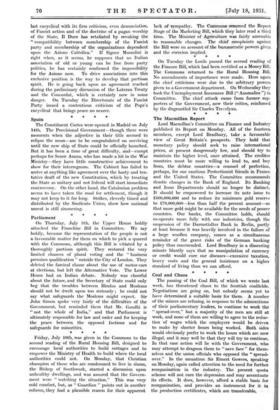Parliament On Thursday, July 9th, the Upper House boldly attacked
the Franchise Bill in Committee. We say boldly, because the representation of the people is not a favourable matter for them on which to pick a quarrel with the Commons, although this Bill is vitiated by a thoroughly partisan spirit. They restored the very limited chances of plural voting and the " business premises qualification " outside the City of London. They deleted the farcical clause about the use of motor-cars at elections, but left the Alternative Vote. The Lower House had an Indian debate. Nobody was cheerful about the future, and the Secretary of State could only beg that the troubles between Hindus and Moslems should not be dwelt upon too seriously ; he could not say what safeguards the Moslems might expect. Sir John Simon spoke very fairly of the difficulties of the Government, but reminded them that Mr. Gandhi is " not the whole of India," and that Parliament is ultimately responsible for law and order and for keeping the peace between the opposed factions and for safeguards for minorities. * * * *


































 Previous page
Previous page